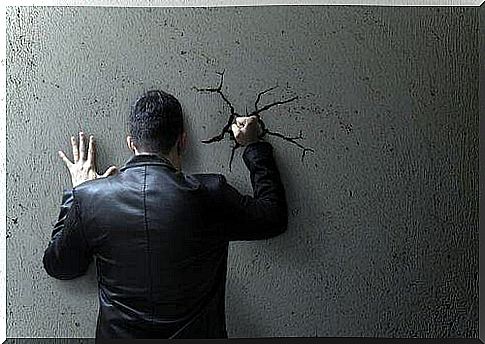7 Traits Of A Suicidal Person

In theory, we all seek happiness and act by following in the footsteps of happiness. In practice, however, many people do not follow this formula. Vice versa. People often do things that just hurt them, and they don’t know why they do. We are now talking about self-destructive people.
We think that self-destructive people behave the way they do because they want to behave that way. They often have a bad time being, but they don’t know why. As a result, they develop behaviors that hurt them.
We all have this side somewhere inside of us. But some turn this side into the core of their personality. Often a self-destructive person scolds himself for a sense of guilt that connects to either real or imagined things. In this article, we talk about the seven most significant traits of a suicidal person.
1. Responding with sadness or irritability when something important has been achieved
When a self-destructive person achieves an important goal, he or she feels an incomprehensible sense of emptiness. After he has fought hard to achieve his goal and also achieved it, he is unable to feel satisfaction.
After achieving these gains, such a person often feels sadness and sometimes even anger. He almost always tries to downplay his accomplishments. He declares that it is absurd to feel happy about such a trivial matter. This is a clear sign of self-destruction.

2. Provoking others, followed by guilt
Suicidal people are usually quite combative. They don’t know why. Nor are they able to avoid the tendency to cause contradictions. In extreme cases, if others say “yes,” they say “no”. If others say “white,” they say “black”.
When they argue with others, it is not uncommon for them to become verbally aggressive or to use ill-considered language. Then, when this storm has subsided, they feel a great guilt that they have caused a dispute. They also feel guilty about what they have said and how they have said it.
3. They do not recognize a sense of well-being, even if it is real
For a suicidal person, nothing is enough. Their biggest difficulty is feeling satisfied, especially about something they have brought about themselves. They focus too much on the black spots on the white sheet.
If such a person feels good or we see him or her feel this way and express it, he or she will feel irritated. He says we are wrong. He seeks within himself a reason not to feel that good feeling to reinforce his state of subjective discomfort.

4. Failure to fulfill promises that are critical to achieving your own goals
A suicidal person boycotts himself. He assures him that he is doing this in an unconscious way. Thus, he forgets important appointments, continues to sleep, or “remembers” the time wrong when he has an important appointment.
It is as if it were necessary for a self-destructive person to avoid all forms of well-being that he would attain. When such a person loses great chances due to this apparent memory or distractions, he finds a new way to discipline himself.
5. Tendency to make sacrifices in front of others
Doing things for others is not only good, it can also be constructive. But in the case of a suicidal person, such altruistic behavior takes on a new meaning. It seems that such a person regularly ignores himself in order to improve the lives of others.
They relatively easily refuse their own well-being to give it to others. They are able to refuse everything in order to help something else, or to flatter something else in an expensive way. Deep down, a self-destructive person feels guilty about something imaginary, and this excessive generosity is just a form of punishment.
6. A suicidal person does not defend himself against ill-treatment
A suicidal person does not know how to defend themselves. In fact, he feels he has no right to defend himself. He has such a low self-image that he feels it is not worth wasting resources to avoid injury.
One way or another, such a person feels that others have a right to offend him. Many of these suicidal behaviors begin with a certain kind of abuse at an early age. Therefore, he assumes this to be “normal”.
7. Boycotting functioning relationships
It is difficult for a suicidal person to make lasting bonds with others. Deep down, a self-destructive person feels that he or she is not worthy of love, or sometimes even worthy of friendship. He feels this way because he doesn’t value himself.

If such a person manages to form a good relationship with another person, he feels strange. There is an inconspicuous voice inside such a person that says, “something is going to go wrong”. In this way, a self-destructive person turns to obsessions and abusers, damaging his good relationship.
A suicidal person suffers a lot and makes others suffer as well. Sometimes this problem is so awkward that he lives in solitude alone. His potential to grow is always limited. Because of all this, this situation requires the help of a professional.









